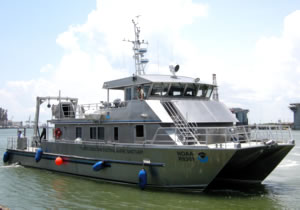
NOAA has launched a new, state-of-the-art research vessel to study the Flower Garden Banks National Marine Sanctuary. credit NOAA
Today, NOAA christened a new, state-of-the-art research vessel that will enhance the study and protection of Flower Garden Banks National Marine Sanctuary in the Gulf of Mexico. The 83-foot R/V Manta will operate out of Galveston, Texas, where the sanctuary is headquartered.
"This technologically advanced research vessel is a vital addition to our fleet," said Daniel J. Basta, director of NOAA's Office of National Marine Sanctuaries. "The Manta will open new windows onto the marine life and habitats of the Flower Garden Banks sanctuary while helping us protect this special place for future generations."
Built in Bellingham, Wash., by All American Marine, the twin-hulled Manta features a laboratory equipped with the latest scientific instruments, air compressors to allow divers to refill scuba tanks at sea, and a recompression chamber to enhance diver safety. The vessel can hold up to 25 people, deploy robot subs and other ocean exploration tools, and cruise at speeds up to 35 knots.
In addition to being a platform for exploring the sanctuary and surrounding waters, the Manta will also serve as a patrol vessel to enforce sanctuary regulations and a floating classroom. Teachers will be regular visitors aboard the Manta to watch and learn as scientists conduct research.
"With the Manta, we will be able to study the sanctuary more intensively, protect it more effectively, and share its wonders with more people than ever before," said G.P. Schmahl, the sanctuary's superintendent. "The vessel's capabilities are as diverse as the sanctuary itself."
Located 115 miles off the Texas/Louisiana coast, Flower Garden Banks National Marine Sanctuary is one of 14 marine protected areas managed by NOAA's Office of National Marine Sanctuaries. The sanctuary includes the two northernmost coral reefs in the continental United States, sponge communities, and other habitats.
